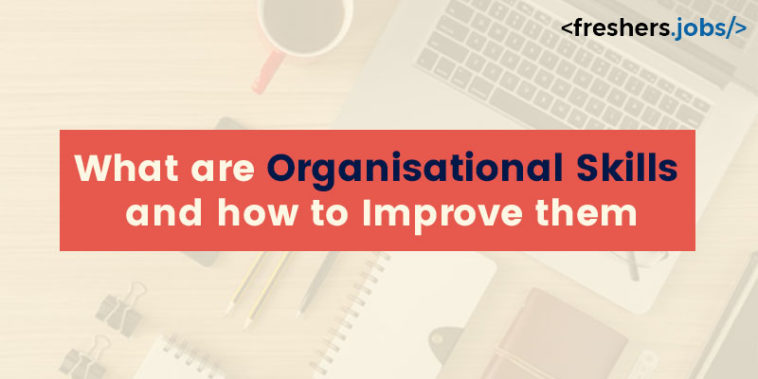Organisational skills are essential in achieving success and maintaining efficiency in personal and professional domains. These skills encompass the ability to effectively manage time, resources, and tasks to accomplish goals in an organised and streamlined manner. A well-developed set of organisational skills can significantly enhance productivity, reduce stress, and create a sense of control over one’s responsibilities.

Fortunately, improving organisational skills is within everyone’s reach, regardless of their current level of organisation. Individuals can enhance their organisational skills and experience numerous benefits by implementing certain strategies and adopting effective habits. This blog will explore practical tips and techniques to help you enhance your organisational skills and achieve greater efficiency in your daily life.
Organisational skills
What are organisational skills? Organisational skills refer to abilities and techniques that enable individuals to effectively manage their time, resources, and tasks to achieve goals efficiently. These skills encompass various aspects, including planning, prioritisation, time management, delegation, and communication. With strong organisational skills, individuals are better equipped to streamline their workflows, stay focused, and meet deadlines consistently. They can create structured systems for organising information, documents, and materials, allowing for easy retrieval when needed. Additionally, organisational skills involve effective coordination with team members, establishing clear roles and responsibilities, and fostering collaboration. By honing these skills, individuals can enhance their productivity, reduce stress, and maintain a sense of control and balance in personal and professional pursuits.
Types of Organisational Skills
Time Management
Time management is one of the fundamental planning and organisational skills. It involves prioritising tasks, setting realistic deadlines, and efficiently allocating time to each activity. Effective time management helps individuals avoid procrastination, meet deadlines, and maintain a healthy work-life balance.
Planning and Goal Setting
Planning and goal setting involves creating a roadmap to achieve specific objectives. This skill requires individuals to break down larger goals into smaller, manageable tasks, allocate resources accordingly, and establish milestones for progress tracking. Individuals can stay focused, motivated, and better organised by having a clear plan and defined goals.
Prioritisation
Prioritisation involves determining the importance and urgency of tasks. It requires individuals to identify critical activities that contribute to overall goals and address them first. Prioritising tasks ensures that valuable time and resources are allocated to the most essential and impactful activities, enhancing productivity and minimising stress.
Organisation and Systemization
Organisation and systematisation skills involve creating efficient systems for storing and retrieving information, documents, and materials. It includes developing effective filing systems and digital organisation methods and utilising tools such as calendars, task managers, and project management software. Well-organized individuals can access needed information quickly, avoid duplication, and improve efficiency.
Delegation and Team Management
Delegation is the skill of assigning tasks to appropriate individuals based on their strengths and expertise. It involves effective communication, trust-building, and identifying the right person for a specific job. Delegation enhances productivity by distributing workload and fostering teamwork.
Communication
Effective communication is vital for organisational success at your freshers jobs. It involves clear and concise expression of ideas, active listening, and collaboration with team members. Strong communication skills facilitate smooth coordination, understanding expectations, and prompt addressing of conflicts or challenges.
Adaptability and Flexibility
Organisational skills also include being adaptable and flexible in the face of changing circumstances. It requires individuals to adjust plans, reallocate resources, and adapt to latest technologies or methodologies. Being flexible enables individuals to respond effectively to unexpected situations and maintain productivity.
Problem Solving
Problem-solving skills involve analysing complex situations, identifying potential issues, and devising effective solutions. It requires critical thinking, creativity, and resourcefulness. Strong problem-solving skills enable individuals to overcome obstacles, streamline processes, and make informed decisions.
Decision Making
Decision-making involves planning and organisational skills, assessing available options, weighing pros and cons, and making informed choices. Effective decision-making considers relevant information, potential risks, and long-term implications. Strong decision-making skills help individuals avoid indecision and maintain progress.
Stress Management
Stress management skills are essential for maintaining productivity and well-being. It involves recognising stress triggers, employing relaxation techniques, and finding healthy coping mechanisms. By managing stress effectively, individuals can stay focused, make better decisions, and maintain a healthy work-life balance.
How to Improve Your Organisation Skills?
Assess Your Current Organizational Skills
Before diving into improvement strategies, evaluating your existing organisational strengths and weaknesses is essential. Take some time to reflect on areas where you feel most organised and those where you struggle. This self-awareness will guide your efforts towards targeted improvement.
Set Clear Goals and Prioritize
Establishing clear goals and priorities is a crucial first step in improving organisational skills. Define what you want to achieve, both short-term and long-term. Break down larger goals into smaller, manageable tasks and rank them based on their importance and urgency. This will help you stay focused and ensure that essential tasks are given the necessary attention.
Having set a clear goal, you can start looking for recent openings in any sector per your educational qualification. Tap to freshers jobs in Pune to get your dream job.
Develop Effective Time Management Habits
Time management lies at the core of organisational skills. Implement the following practices to enhance your time management abilities:
- Create a Schedule: Use calendars, planners, or digital tools to create a schedule that outlines your daily, weekly, and monthly activities. Allocate specific time blocks for different tasks, including work, personal commitments, and relaxation.
- Prioritize Tasks: Determine the most critical tasks that align with your goals and tackle them first. Avoid the temptation to engage in less important activities before completing vital ones.
- Avoid Procrastination: Procrastination hinders organisational skills. Combat this tendency by breaking tasks into smaller, manageable parts, setting deadlines for each, and holding yourself accountable.
- Minimize Distractions: Identify and eliminate or reduce distractions that hinder your focus and productivity. This could include turning off notifications, creating a dedicated workspace, or utilising productivity apps.
Implement Effective Planning Strategies
Effective planning is a cornerstone of organizational skills. Try the following techniques to improve your planning abilities:
- Break Tasks into Smaller Steps: Break them down into smaller, actionable steps for complex projects. This approach helps you see the path forward more clearly and prevents overwhelm.
- Use To-Do Lists: Create daily or weekly to-do lists that capture all tasks and responsibilities. Update them regularly and cross off completed items, providing a sense of accomplishment and progress.
- Utilize Technology: Leverage digital tools like project management software or task management apps to streamline planning and task tracking. These tools can help you stay organised, collaborate with others, and set reminders.
Enhance Communication Skills
Effective communication is vital for organisational success. Focus on improving your communication skills through the following practices:
- Active Listening: Practice active listening by giving your full attention to others during conversations or meetings. Take notes, ask clarifying questions, and ensure you understand instructions or expectations.
- Clear and Concise Expression: Improve your ability to articulate thoughts and ideas clearly and concisely. Use simple and direct language to convey your message effectively.
- Practice Professional Written Communication: What are organisation skills and how to develop it? Enhance your written communication skills, including email etiquette, report writing, and document organisation for high freshers salary. Clear and well-structured written communication facilitates efficient collaboration and avoids misunderstandings.
Embrace Technology and Organizational Tools
Leverage technology and organisational tools to streamline your workflow and stay organised. Explore the following options:
- Digital Calendars and Reminders: Utilize digital calendars to schedule appointments, set reminders, and manage deadlines. Sync your calendar across devices for easy access.
- Project Management Software: If you work on complex projects or collaborate with a team, consider using project management software as the importance of organising. These tools allow you to assign tasks, track progress, and manage deadlines in a centralised system.
- Cloud Storage: Utilize cloud storage platforms to store and organise digital files. This enables easy access and collaboration and ensures data backup.
Continuously Improve and Adapt
Organisational skills are not fixed; they can be continuously improved and refined. Foster a growth mindset and embrace job opportunities to learn and adapt. Seek feedback from colleagues or mentors, reflect on your experiences, and adjust accordingly.



